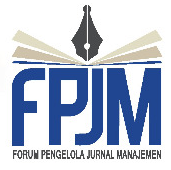Cognitive Dissonance, Business Longevity, and Spiritual Values of Business in Bali Post-Pandemic
Abstract
This study refers to a phenomenon among Balinese business practices that is faced with new situations so that a conflict arises between beliefs and something that must be lived but is considered contrary to attitudes. The new situation is the impact of the pandemic that can affect business continuity. The purpose of this study was to examine the effect of Cognitive Dissonance on Business Longevity and the effect of Cognitive Dissonance on Business Longevity moderated by Spiritual Values. The research method used is quantitative method and purposive sampling as sampling. The data obtained were then processed with SPSS. This study has a sample of 120 respondents who are business practices in Badung, Bali. The results showed that Cognitive Dissonance had a significant effect on Business Longevity. Moreover, there is no moderating effect exerted by Spiritual Value in the relationship between Cognitive Dissonance and Business Longevity. However, this study found that Spiritual Values can have a partial effect on Business Longevity.
Keywords
Full Text:
PDFReferences
Adwitya Sanjaya, P. K. (2018). Etika Bisnis Dan Entrepreneurship Dalam Pembangunan Ekonomi Bali: Dalam Perspektif Hindu. Dharmasmrti: Jurnal Ilmu Agama Dan Kebudayaan, 18(1), 93–101. https://doi.org/10.32795/ds.v1i18.106
Ahmad, S., Omar, R., & Quoquab, F. (2019). Corporate Sustainable Longevity: Scale Development and Validation. SAGE Open, 9(1). https://doi.org/10.1177/2158244018822379
Ahmad, S., Omar, R., & Quoquab, F. (2021). Family firms’ sustainable longevity: the role of family involvement in business and innovation capability. Journal of Family Business Management, 11(1), 86–106. https://doi.org/10.1108/JFBM-12-2019-0081
Aronson, E. (1969). The theory of cognitive dissonance: A current perspective. Advances in experimental social psychology, 4, 1–34..
Artana, I. W. (2016). Tri Hita Karana Meningkatkan Kualitas Modal Manusia Dari Perspektif Kesehatan. Piramida, 10(2), 100–105.
Badan Pusat Statistik. (2020). Ekonomi Bali Tumbuh Negatif 1 , 14 % Imbas Covid-19
Bagozzi, R. P., Yi, Y., & Phillips, L. W. (1991). Assessing Construct Validity in Organizational Research. Administrative Science Quarterly, 36(3), 421–458. http://www.jstor.org/stable/2393203
Büssing, A. (2019). Measures of spirituality/religiosity (2018). MDPI-Multidisciplinary Digital Publishing Institute.
Festinger, L. (1957). A theory of cognitive dissonance (Vol. 2). Stanford university press.
Foster, S., & Foster, A. (2019). The impact of workplace spirituality on work-based learners. Journal of Work-Applied Management, 11(1), 63–75. https://doi.org/10.1108/jwam-06-2019-0015
Fry, L. W. (2005). Introduction to the leadership quarterly special issue: Toward a paradigm of spiritual leadership.
Harmon, J. E., Amodio, D. M., & Harmon, J. C. (2009). Chapter 3 Action-Based Model of Dissonance. A Review, Integration, and Expansion of Conceptions of Cognitive Conflict. In Advances in Experimental Social Psychology (1st ed., Vol. 41, Issue 08). Elsevier Inc. https://doi.org/10.1016/S0065-2601(08)00403-6
Heryjanto, A. (2019). Peran Visi Bagi Kelanggengan Bisnis Keluarga. Praxis, 2(1), 30. https://doi.org/10.24167/praxis.v2i1.2104
Hutasoit, H., & Wau, R. (2017). Menuju Sustainability Dengan Tri Hita Karana (Sebuah Studi Interpretif Pada Masyarakat Bali). Business Management Journal, 13(2), 151–168. https://doi.org/10.30813/bmj.v13i2.917
Kementrian Keuangan Republik Indonesia. (2021). Bali Tetap Kuat di Tengah Pandemi. Kementrian Keuangan Republik Indonesia. https://www.kemenkeu.go.id/publikasi/artikel-dan-opini/bali-tetap-kuat-di-tengah-pandemi/
Khatimah, H. K. (2021). Karakteristik Wirausaha dan Spiritualitas sebagai Penentu Keberhasilan Usaha UMKM di Jawa Barat. JRAK: Jurnal Riset Akuntansi Dan …, 88349033(83). http://jurnal.unismabekasi.ac.id/index.php/jrak/article/view/2408
Mahdani. (2017). Spiritual Tempat Kerja, Sikap Kerja Positif, dan Spiritualitas Individual Karyawan (Studi pada PT. Pupuk Iskandar Muda (Persero) Lhokseumawe). Jurnal E-KOMBIS, III(1), 17–31.
Metin, I., & Camgoz, S. (2011). The advances in the history of cognitive dissonance theory. International Journal of Humanities and Social. 1(6), 131–136. http://www.ijhssnet.com/journals/Vol._1_No._6;_June_2011/14.pdf
Muafi, M. (2020). Nexus Between Islamic Spiritual Value, Cognitive Dissonance, Perceived Social Status, and Business Longevity. Esensi: Jurnal Bisnis Dan Manajemen, 10(1), 1–18. https://doi.org/10.15408/ess.v10i1.13714
Pancawati, N. (2020). Spiritual Entreprenuer: Konsep Kewirausahaan Dalam Perspektif Hindu. Jayapangus Press Books, 1934, 101–114. http://jayapanguspress.penerbit.org/index.php/JPB/article/download/528/522
Raco, J., Ohoitimur, J., & Sobon, K. (2019). Spirituality: The Power of Entrepreneurship. EMAJ: Emerging Markets Journal, 9(1), 28–35. https://doi.org/10.5195/emaj.2019.161
Ramachandran, B. J., & Subramanian, R. (2017). Cognitive Dissonance Impact of GST Implementation Perception of Strata Property Owners in Malaysia. 4, 28–31.
Rezapouraghdam, H., Alipour, H., & Arasli, H. (2019). Workplace spirituality and organization sustainability: a theoretical perspective on hospitality employees’ sustainable behavior. Environment, Development and Sustainability, 21(4), 1583–1601. https://doi.org/10.1007/s10668-018-0120-4
Shah, J., & Lacaze, D. (2018). Moderating role of cognitive dissonance in the relationship of islamic work ethics and job satisfaction, turnover intention & job performance. 29ème Congrès AGRH 2018, 1–19. https://hal.archives-ouvertes.fr/hal-01901056/
Sharma, K., & Dixit, M. R. (2017). Live long and prosper: the search for business longevity. Strategic Direction, 33(11), 1–3. https://doi.org/10.1108/SD-06-2017-0088
Sharma, K. R., & Dixit, M. R. (2018). Longevity challenges and leadership interventions: Strategy journeys of two Indian banks. Business History, 60(2), 178–201. https://doi.org/10.1080/00076791.2017.1363735
Suriyankietkaew, S., & Kantamara, P. (2019). Business ethics and spirituality for corporate sustainability: a Buddhism perspective. Journal of Management, Spirituality and Religion, 16(3), 264–289. https://doi.org/10.1080/14766086.2019.1574598
Sweeney, J. C., Hausknecht, D., & Soutar, G. N. (2000). Cognitive Dissonance after Purchase: A Multidimensional Scale. Psychology & Marketing, 17(5), 369–385.
Tjiptono, F. (2013). Kelanggengan Entrepreneurship dalam Bentuk Bisnis Keluarga : Apa yang Telah dan Masih Perlu Diungkap. Entrepreneur Dan Entrepreneurship, 2(2), 1–12.
Vasconcelos, A. F. (2021). Individual spiritual capital: meaning, a conceptual framework and implications. Journal of Work-Applied Management, 13(1), 117–141. https://doi.org/10.1108/jwam-08-2020-0038
Wijaya, I. G. B. (2022). Etika kewirausahaan berdasarkan ajaran weda. 1(1), 44–51.
DOI: https://doi.org/10.26905/jmdk.v10i2.7866
Refbacks
- There are currently no refbacks.
Copyright (c) 2022 Jurnal Manajemen dan Kewirausahaan
Indexing by:
| | |
Index Copernicus International (ICI)
Tools:
In Collaboration with:
 |
Jurnal Manajemen dan Kewirausahaan Management Department Faculty of Economics University of Merdeka Malang MAILING ADDRESS
|






